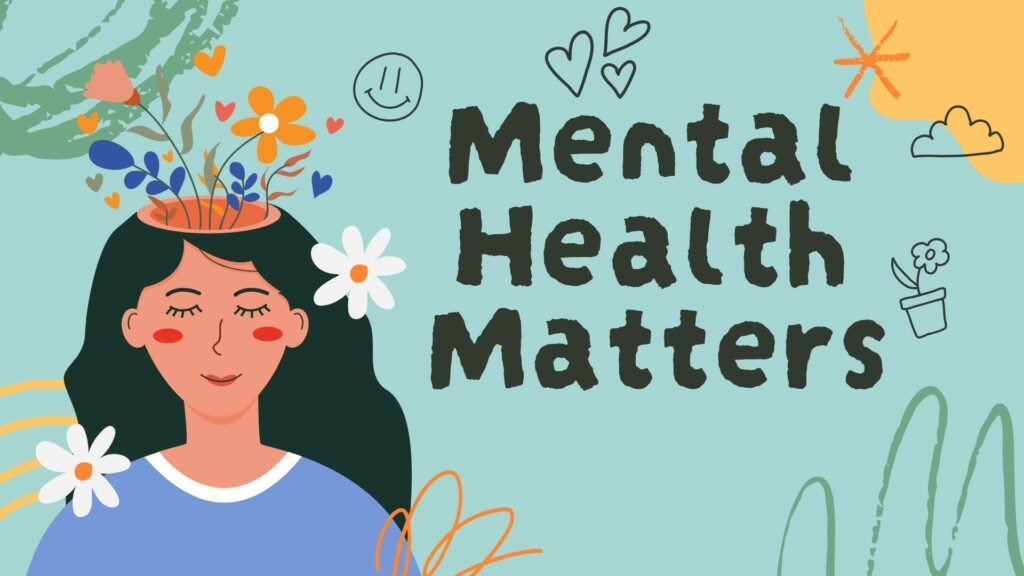Introduction
Why Mental Health Deserves Attention Now More Than Ever
In today’s fast-paced world, mental health is often overshadowed by external demands and digital distractions. Yet, the effects of poor mental well-being are undeniable—rising anxiety levels, burnout, depression, and emotional instability are now common struggles. The problem? Mental health often takes a backseat. The solution? Prioritizing it the same way we do our physical health.
This blog answers questions like: Why does mental health matter? What simple habits can improve mental well-being? How can visual tools like a Self Care Vision Board or Vision Board Wallpaper help? By the end, readers will understand not only the importance of mental wellness but also actionable strategies to support it.
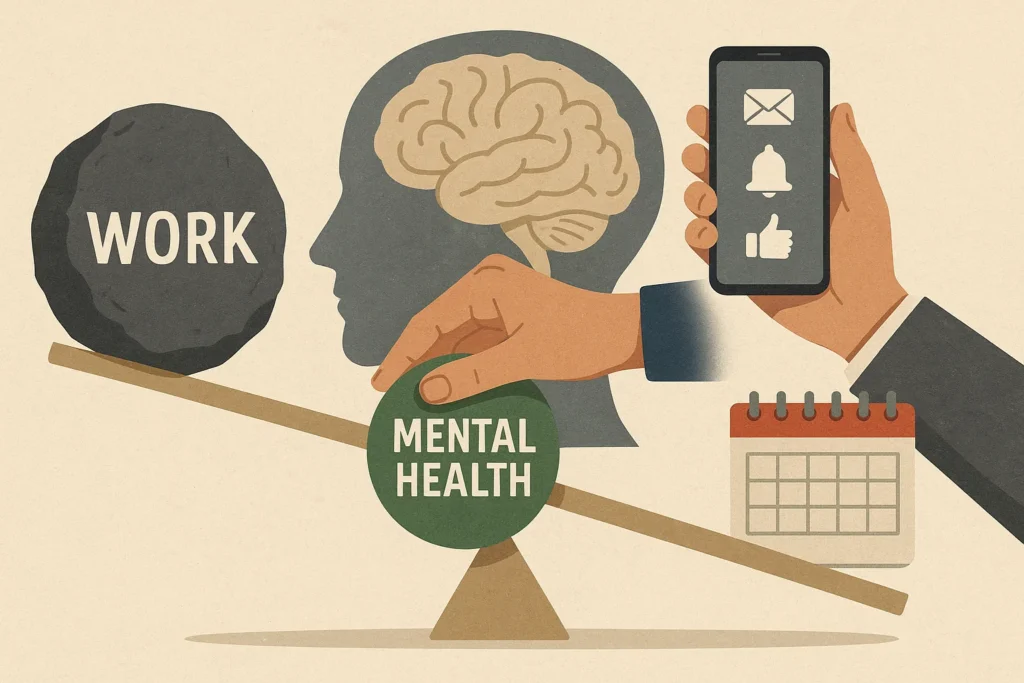
Understanding Why Mental Health Matters
Mental health is more than the absence of mental illness—it’s the foundation of emotional, psychological, and social well-being. According to the World Health Organization (2024), over 1 in 8 people globally live with a mental disorder, yet a large number never seek help.
The stigma surrounding “My Mental Health” often silences individuals. But recognizing mental health as a critical part of overall wellness allows individuals to take proactive steps. It affects how people think, feel, relate to others, and make choices.
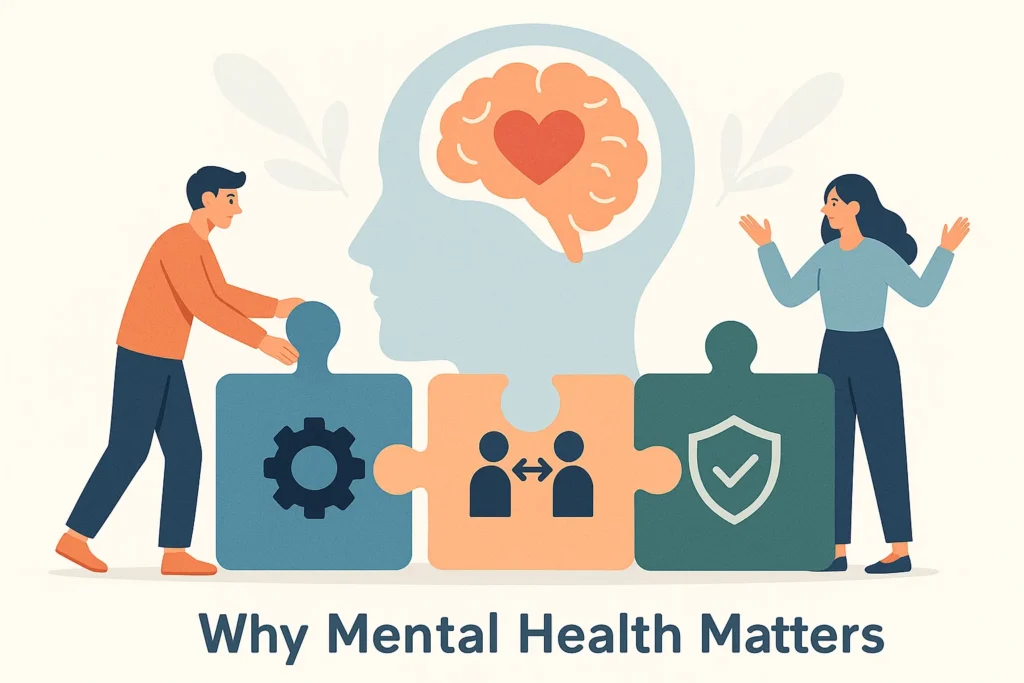
Why it matters:
- It influences daily functioning and productivity.
- It shapes relationships and communication.
- It prevents more serious disorders from developing.
Atomic Habits for Better Mental Health
James Clear’s book Atomic Habits introduces the idea that small, consistent actions lead to lasting change. This is especially relevant for mental wellness.
Here’s how micro-habits support better mental health:
- Daily journaling to release emotions.
- Digital detoxes to reduce anxiety.
- Gratitude exercises to reframe negative thoughts.
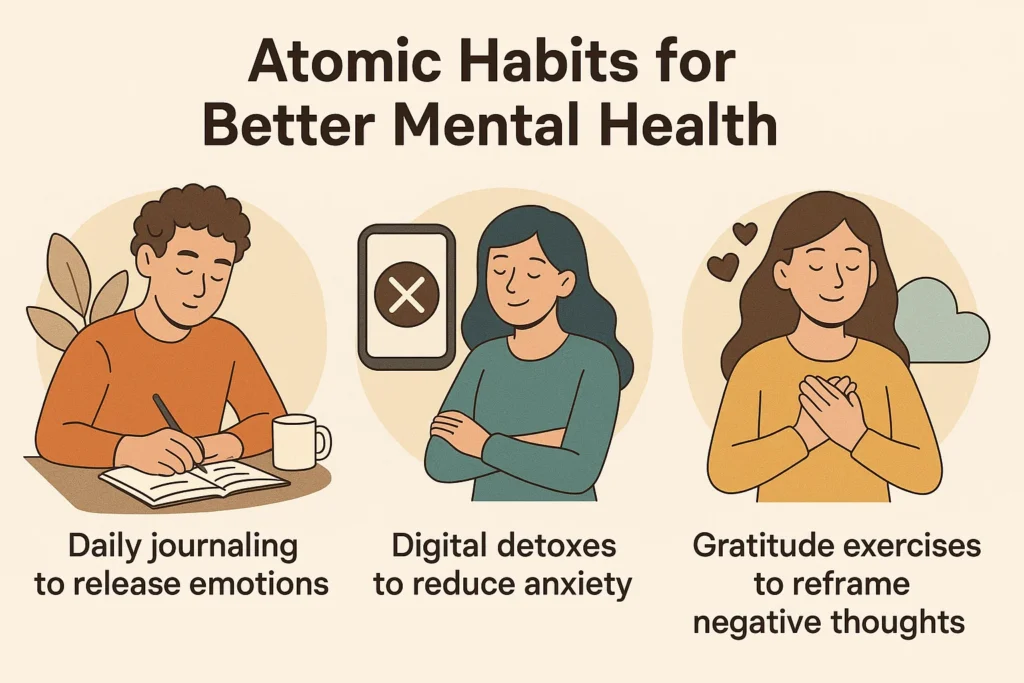
“Small changes make a big difference when practiced daily.” — Atomic Habits
Incorporating even one new habit, like a 5-minute meditation or a mood tracker, can reduce stress and build resilience.
Vision Boards: Visual Tools That Heal
Creating a Self Care Vision Board or Vision Board Wallpaper may seem like a fun art project, but it holds deeper psychological benefits.
Benefits:
- Provides mental clarity and goal-setting.
- Acts as a daily reminder of priorities like rest, joy, connection.
- Promotes hope and positive self-perception.
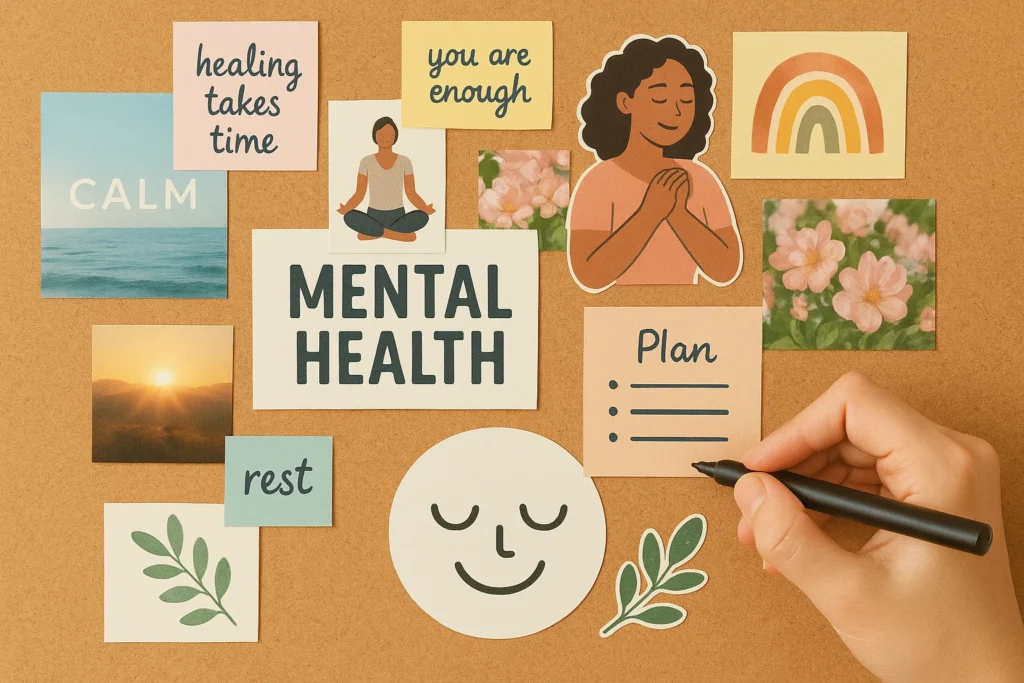
Clinical psychologists suggest vision boards work by activating the Reticular Activating System (RAS)—a brain function that filters and amplifies information we focus on. So, when your mind repeatedly sees affirmations or imagery related to Motivational Mental Health, it begins to align with those beliefs.
Feminine Health and Mental Wellness
Women face unique mental health challenges tied to hormonal changes, societal expectations, and body image pressures. Supporting feminine health—from menstrual cycles to menopause—also supports mental well-being.
Quick Facts:
- PMS and PMDD are linked with mood swings and depression.
- Women are twice as likely to experience anxiety disorders than men (APA, 2024).
Creating support networks, having regular checkups, and practicing body positivity help women feel seen and supported. Mindful self-care routines and open conversations with therapists are also essential tools.
Body Positivity & Emotional Resilience
Body Positivity is more than just a trend—it’s a mental health movement. Accepting one’s body, regardless of size, color, or shape, fosters emotional security and combats harmful perfectionism.
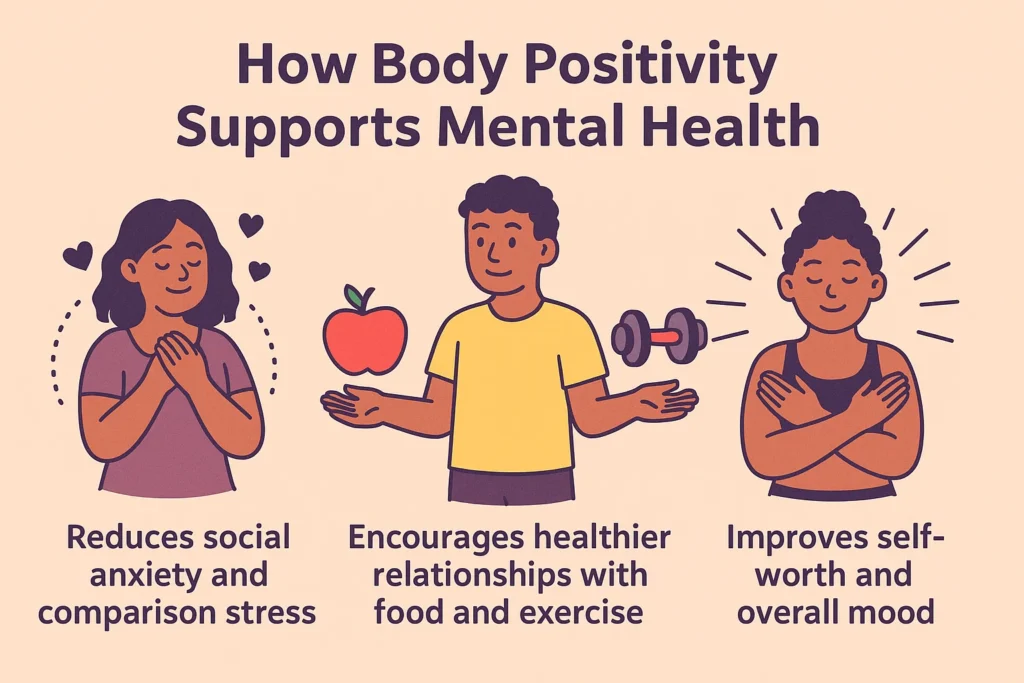
How Body Positivity Supports Mental Health:
- Reduces social anxiety and comparison stress.
- Encourages healthier relationships with food and exercise.
- Improves self-worth and overall mood.
Pairing this mindset with therapy quotes and affirmations like “You are enough just as you are” can be incredibly healing.
Be Kind to Your Mind: Emotional Hygiene Matters
You wouldn’t skip brushing your teeth—so why skip emotional maintenance? Being kind to your mind means addressing emotional wounds, negative self-talk, and mental overload.
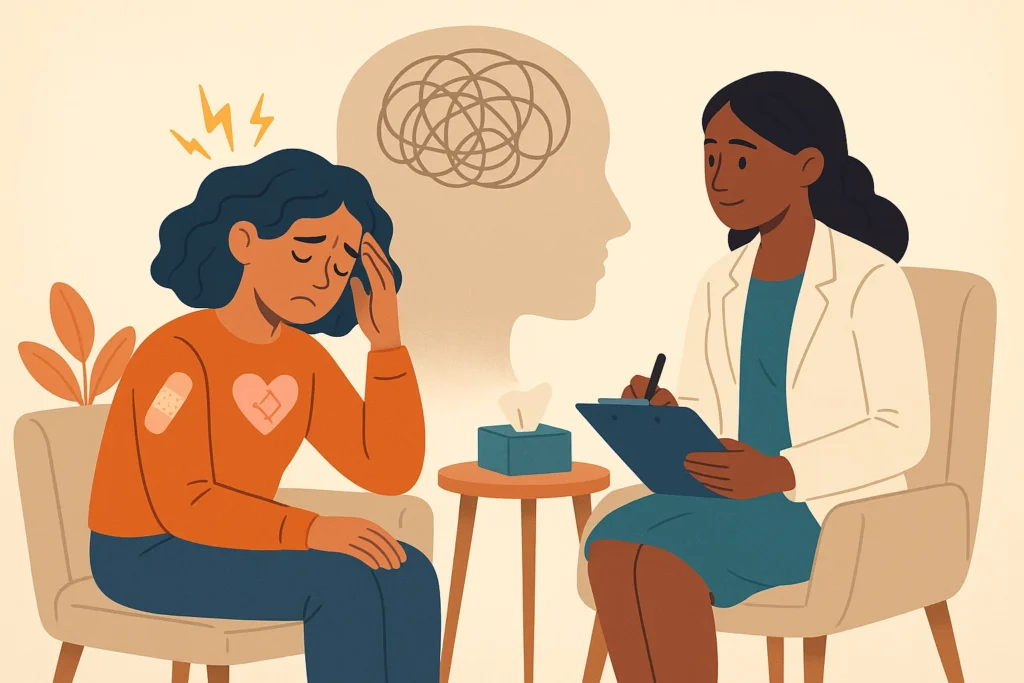
Practices to implement:
- Weekly “mind check-ins” with yourself.
- Journaling therapy prompts like “How am I really feeling today?”
- Practicing compassion with setbacks.
Mental health experts call this “emotional hygiene”—a proactive way to prevent emotional breakdowns. Simple phrases like Be Kind to Your Mind serve as gentle, daily reminders to prioritize inner peace.
Therapy Quotes & Positive Affirmations
Therapy quotes and affirmations offer a therapeutic, low-effort way to improve mindset. They serve as mental anchors when you’re feeling overwhelmed or discouraged.
Here are a few favorites:
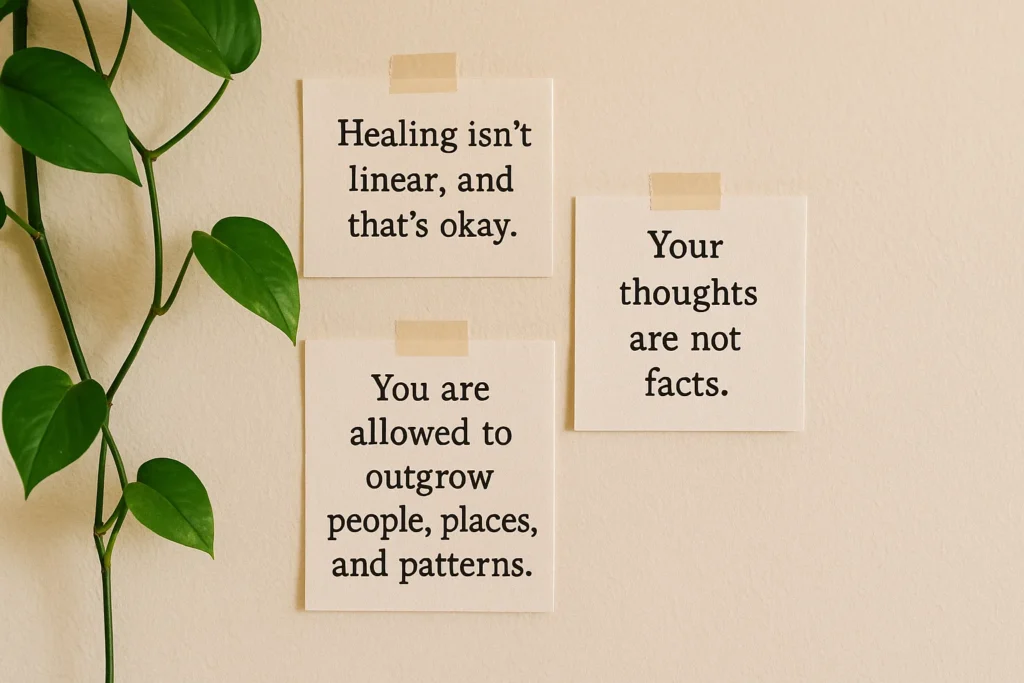
- “Healing isn’t linear, and that’s okay.”
- “Your thoughts are not facts.”
- “You are allowed to outgrow people, places, and patterns.”
These phrases help shift negative internal dialogue into something softer and more compassionate—leading to better mental health over time.
Frequently Asked Questions
Q1: How can I start improving my mental health today?
Start with one small action like journaling, taking a walk, or limiting social media. Using tools like a Self Care Vision Board or Atomic Habits can be a helpful start.
Q2: Do therapy quotes really help?
Yes. According to multiple studies, positive affirmations and repetition can rewire negative thought patterns and support emotional resilience.
Q3: How is feminine health connected to mental health?
Hormonal changes significantly impact mood. Addressing feminine health through education and support can lead to greater emotional stability and wellness.
Q4: Are vision boards scientifically backed?
While the concept isn’t heavily studied, they align with cognitive behavioral principles and RAS activation, helping individuals stay focused on wellness goals.
Final Thoughts:
Your Mental Health Deserves Daily Care
Mental health matters—not just in moments of crisis, but every single day. Whether it’s practicing body positivity, creating a calming vision board wallpaper, or simply reminding yourself to Be Kind To Your Mind, small actions lead to real transformation.
When we recognize that “My Mental Health” is a vital part of who we are, we give ourselves permission to prioritize, protect, and nurture it. Because a healthier mind means a fuller, freer life.
